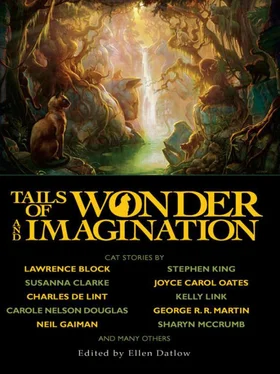Ellen Datlow - Tails of Wonder and Imagination
Здесь есть возможность читать онлайн «Ellen Datlow - Tails of Wonder and Imagination» весь текст электронной книги совершенно бесплатно (целиком полную версию без сокращений). В некоторых случаях можно слушать аудио, скачать через торрент в формате fb2 и присутствует краткое содержание. Год выпуска: 2010, ISBN: 2010, Издательство: Night Shade Books, Жанр: Фэнтези, Фантастика и фэнтези, Ужасы и Мистика, на английском языке. Описание произведения, (предисловие) а так же отзывы посетителей доступны на портале библиотеки ЛибКат.
- Название:Tails of Wonder and Imagination
- Автор:
- Издательство:Night Shade Books
- Жанр:
- Год:2010
- ISBN:978-1-59780-170-6
- Рейтинг книги:5 / 5. Голосов: 1
-
Избранное:Добавить в избранное
- Отзывы:
-
Ваша оценка:
- 100
- 1
- 2
- 3
- 4
- 5
Tails of Wonder and Imagination: краткое содержание, описание и аннотация
Предлагаем к чтению аннотацию, описание, краткое содержание или предисловие (зависит от того, что написал сам автор книги «Tails of Wonder and Imagination»). Если вы не нашли необходимую информацию о книге — напишите в комментариях, мы постараемся отыскать её.
collects the best of the last thirty years of science fiction and fantasy stories about cats from an all-star list of contributors.
Tails of Wonder and Imagination — читать онлайн бесплатно полную книгу (весь текст) целиком
Ниже представлен текст книги, разбитый по страницам. Система сохранения места последней прочитанной страницы, позволяет с удобством читать онлайн бесплатно книгу «Tails of Wonder and Imagination», без необходимости каждый раз заново искать на чём Вы остановились. Поставьте закладку, и сможете в любой момент перейти на страницу, на которой закончили чтение.
Интервал:
Закладка:
Kefira Qay spent the next week and a half avoiding Tuf as much as possible. She skipped dinner and scowled when she saw him in the corridors. Each day she repaired to the communications room, where she had long discussions with her superiors below, and kept up on all the latest news. It was bad. All the news was bad.
Finally, things came to a head. Pale-faced and furious, she stalked into the darkened chamber Tuf called his “war room,” where she found him sitting before a bank of computer screens, watching red and blue lines chase each other across a grid. “ Tuf!” she roared. He turned off the screen and swung to face her, batting away Ingratitude. Shrouded by shadows, he regarded her impassively. “The Council of Guardians has given me an order,” she said.
“How fortunate for you,” Tuf replied. “I know you have been growing restless of late from inactivity.”
“The Council wants immediate action, Tuf. Immediate. Today. Do you understand?”
Tuf steepled his hands beneath his chin, almost in an attitude of prayer. “Must I tolerate not only hostility and impatience, but slurs on my intelligence as well? I understand all that needs understanding about your Guardians, I assure you. It is only the peculiar and perverse ecology of Namor that I do not understand. Until I have acquired that understanding, I cannot act.”
“You will act,” said Kefira Qay. Suddenly a laser pistol was in her hand, aimed at Tuf’s broad paunch. “You will act now.”
Haviland Tuf reacted not at all. “Violence,” he said, in a voice of mild reproach. “Perhaps, before you burn a hole in me and thereby doom yourself and your world, you might give me the opportunity to explain?”
“Go on,” she said. “I’ll listen. For a little while.”
“Excellent,” said Haviland Tuf. “Guardian, something very odd is happening on Namor.”
“You’ve noticed,” she said drily. The laser did not move.
“Indeed. You are being destroyed by an infestation of creatures that we must, for want of a better term, collectively dub sea monsters. Three species have appeared, in less than half a dozen standard years. Each of these species is apparently new, or at least unknown. This strikes me as unlikely in the extreme. Your people have been on Namor for one hundred years, yet not until recently have you had any knowledge of these things you call dreadnaughts, fire-balloons, and walkers. It is almost as if some dark analogue of my Ark were waging biowar upon you, yet obviously that is not the case. New or old, these sea monsters are native to Namor, a product of local evolution. Their close relatives fill your seas—the mud-pots, the bobbing freddies, the jellydancers and men-of-war. So. Where does that leave us?”
“I don’t know,” said Kefira Qay.
“Nor do I,” Tuf said. “Consider further. These sea monsters breed in vast numbers. The sea teems with them, they fill the air, they overrun populous islands. They kill. Yet they do not kill each other, nor do they seem to have any other natural enemies. The cruel checks of a normal ecosystem do not apply. I have studied the reports of your scientists with great interest. Much about these sea monsters is fascinating, but perhaps most intriguing is the fact that you know nothing about them except in their full adult form. Vast dreadnaughts prowl the seas and sink ships, monstrous fire-balloons swirl across your skies. Where, might I ask, are the little dreadnaughts, the baby balloons? Where indeed.”
“Deep under the sea.”
“Perhaps, Guardian, perhaps. You cannot say for certain, nor can I. These monsters are most formidable creatures, yet I have seen equally formidable predators on other worlds. They do not number in hundreds or thousands. Why? Ah, because the young, or the eggs, or the hatchlings, they are less formidable than the parents, and most die long before reaching their terrible maturity. This does not appear to happen on Namor. It does not appear to happen at all. What can it all mean? What indeed.” Tuf shrugged. “I cannot say, but I work on, I think, I endeavor to solve the riddle of your overabundant sea.”
Kefira Qay grimaced. “And meanwhile, we die. We die, and you don’t care.”
“I protest!” Tuf began.
“Silence,” she said, waving the laser. “I’ll talk now, you’ve given your speech. Today we lost contact with the Broken Hand. Forty-three islands, Tuf. I’m afraid to even think how many people. All gone now, in a single day. A few garbled radio transmissions, hysteria, and silence. And you sit and talk about riddles. No more. You will take action now. I insist. Or threaten, if you prefer. Later, we will solve the whys and hows of these things. For the moment, we will kill them, without pausing for questions.”
“Once,” said Haviland Tuf, “there was a world idyllic but for a single flaw—an insect the size of a dust mote. It was a harmless creature, but it was everywhere. It fed on the microscopic spores of a floating fungus. The folk of this world hated the tiny insect, which sometimes flew about in clouds so thick they obscured the sun. When citizens went outdoors, the insects would land on them by the thousands, covering their bodies with a living shroud. So a would-be ecological engineer proposed to solve their problem. From a distant world, he introduced another insect, larger, to prey on the living dust motes. The scheme worked admirably. The new insects multiplied and multiplied, having no natural enemies in this ecosystem, until they had entirely wiped out the native species. It was a great triumph. Unfortunately, there were unforeseen side effects. The invader, having destroyed one form of life, moved on to other, more beneficial sorts. Many native insects became extinct. The local analogue of bird life, deprived of its customary prey and unable to digest the alien bug, also suffered grievously. Plants were not pollinated as before. Whole forests and jungles changed and withered. And the spores of the fungus that had been the food of the original nuisance were left unchecked. The fungus grew everywhere—on buildings, on food crops, even on living animals. In short, the ecosystem was wrenched entirely askew. Today, should you visit, you would find a planet dead but for a terrible fungus. Such are the fruits of hasty action, with insufficient study. There are grave risks should one move without understanding.”
“And certain destruction if one fails to move at all,” Kefira Qay said stubbornly. “No, Tuf. You tell frightening tales, but we are a desperate people. The Guardians accept whatever risks there may be. I have my orders. Unless you do as I bid, I will use this.” She nodded at her laser.
Haviland Tuf folded his arms. “If you use that,” he said, “you will be very foolish. No doubt you could learn to operate the Ark in time. The task would take years, which by your own admission you do not have. I shall work on in your behalf, and forgive you your crude bluster and your threats, but I shall move only when I deem myself ready. I am an ecological engineer. I have my personal and professional integrity. And I must point out that, without my services, you are utterly without hope. Utterly. So, since you know this and I know this, let us dispense with further drama. You will not use that laser.”
For a moment, Kefira Qay’s face looked stricken. “You…” she said in confusion; the laser wavered just a bit. Then her look hardened once again. “You’re wrong, Tuf,” she said. “I will use it.”
Haviland Tuf said nothing.
“Not on you,” she said. “On your cats. I will kill one of them every day, until you take action.” Her wrist moved slightly, so the laser was trained not on Tuf, but on the small form of Ingratitude, who was prowling hither and yon about the room, poking at shadows. “I will start with this one,” the Guardian aid. “On the count of three.”
Читать дальшеИнтервал:
Закладка:
Похожие книги на «Tails of Wonder and Imagination»
Представляем Вашему вниманию похожие книги на «Tails of Wonder and Imagination» списком для выбора. Мы отобрали схожую по названию и смыслу литературу в надежде предоставить читателям больше вариантов отыскать новые, интересные, ещё непрочитанные произведения.
Обсуждение, отзывы о книге «Tails of Wonder and Imagination» и просто собственные мнения читателей. Оставьте ваши комментарии, напишите, что Вы думаете о произведении, его смысле или главных героях. Укажите что конкретно понравилось, а что нет, и почему Вы так считаете.












